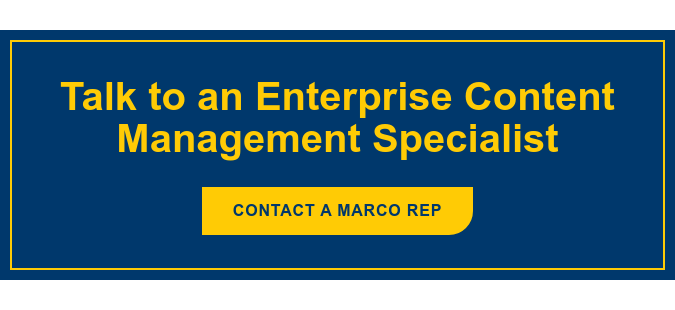Many large companies were early adopters of Enterprise Content Management (ECM) tools because they’re extraordinarily helpful when it comes to meeting regulatory compliance, enhancing cybersecurity, minimizing drudge work, and optimizing business processes. But the market for these tools is growing quickly as more small to midsize businesses are jumping on board.
But if your organization has had other priorities over the past few years, I’m happy to summarize what our other clients have asked along with plain-spoken answers.
Let’s start with the basics…
1. What Is Enterprise Content Management Software?
Enterprise Content Management software is kind of like a virtual library, but that’s underselling it by quite a bit. Not only can it help your staff find important documents and records quickly, but it can also help you keep sensitive information out of the wrong hands. And then there’s this: it can help you automate those important but unpleasant paper-pushing tasks throughout your organization.
How It Works
ECM accomplishes all of these things with the help of five separate components: capture, manage, store, preserve, and deliver. I’ll break each of these down a bit.
Capturing Your Documents
To get started, you’ll use automated document capture tools to digitize any paper documents. From there, your ECM platform will help you index that data or add it to workflows.
Managing Your Data
Once your data is digitized, you can let your ECM platform do the heavy lifting and manage your documents for you. ECM tools can also reduce your business storage needs by getting rid of duplicate and outdated versions of files.
Storing Important Files
You don’t want data in the wrong hands, but you don’t want it to be lost either. Your ECM solution should be quick to back up frequently changing information in the short term while allowing users to access and edit it as needed.
Preserving Documents
This sounds like a repeat, but your ECM tool should also be able to help you secure important documents when they’re no longer being revised. This feature is especially helpful for organizations that need to meet compliance.
Delivering Documents Intuitively
Keeping sensitive data private is important, but with ECM tools, security doesn’t have to hinder productivity. Your platform should also help deliver files and data quickly when an authorized user has a legitimate need.
2. What Are the Benefits of ECM Software?
It might be simpler to answer this question by first explaining what frequently goes wrong at organizations without an ECM solution.
You know, like sales teams that resent the time they spend filling out paperwork, important contracts not being approved on time because they’re stuck on someone’s desk, frustrating onboarding processes, slow customer service, and a lack of insight into long-term client relationships.

ECM tools help you solve these problems and eliminate the blame game that can often accompany them. That’s why the “digital library” description is underselling this tool by a mile. It’s more than just a digital library, even one that comes with its own robot librarian. It’s more like giving every single person in your company their own personal robot assistant to make them more efficient, more organized, and more productive…while also making them happier at work.
And if all of that sounds like it could drive some serious ROI, you’re right. According to a study by Nucleus Research:
Small to midsize businesses that adopted an ECM solution experienced a 750% return on their investment.
3. What Features Should I Look for?
Every organization is different, but depending on your needs, you might keep an eye out for the following capabilities:
- Advanced search tools that support more sophisticated queries, and offer results according to user’s role and probable intent
- Analytics to help you identify and solve problems that frequently cause delays and bottlenecks, and understand how your staff is using documents and information
- Artificial intelligence that helps remove old information, and is capable of extracting information and storing it in a more helpful place
- Tools that can help you manage CAD (Computer-Aided Design) files
- Features that help you access, organize, and save files that were sent through email
- Robust records management if your organization has to meet regulatory compliance
- The ability to track different versions of the same document to optimize collaboration and reduce confusion
- Hosting services — either on-premises or in the cloud to free up digital storage space
4. Can ECM Software Integrate With Other Tools?
This is an easy one. Yes!
The best ECM platforms can work seamlessly with Customer Relationship Management (CRM) tools, Human Resource Management (HRM) tools, as well as enterprise resource planning (ERP) and accounting platforms, so your staff doesn’t have to enter the same information over and over, and they’ll be working with one set of data that they can trust.
5. What Are Some Good Enterprise Content Management Examples?
There are many great examples of ECM solutions, but that’s often the problem with digital tools! At Marco, we’ve tried our best to narrow it down for our clients. We find that the vast majority are best served through M-Files.
It hits the sweet spot of being feature-rich but fairly simple to start using. Plus, we can provide implementation and training as well as insider pricing.
6. How Can I Save Money on Enterprise Content Management Services?
Okay, you got me. This isn’t one I’m always asked, but I suspect it’s one every client secretly wants to know.
Here’s the funny thing about software subscriptions — the age-old rule about saving money by cutting out the middle man no longer applies. Software developers know they don’t provide the best customer support, and would much rather a provider did that work instead. So they partner with companies like ours and offer volume discounts we can pass on to our clients.
In addition to saving you money, our ECM specialists:
- Provide expert-level support
- Can help with deployment, including discovery, analysis, and design to support your organization’s goals
- End-user training
Interested in learning more about ECM? Click the link below!
